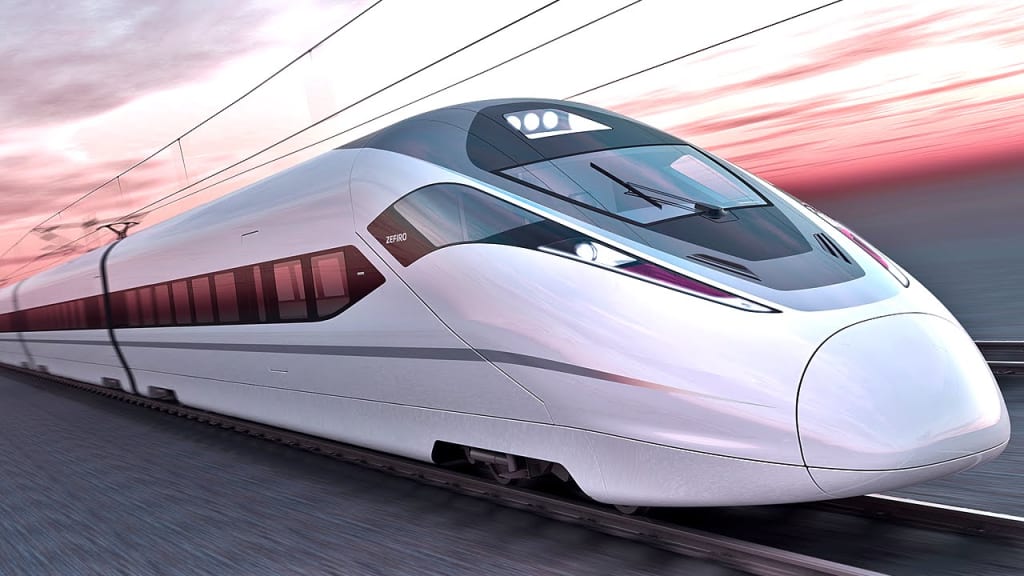The Conspiracy of Movement
Why corporations don’t want you to travel fast

In the modern day, the majority of Americans use cars for everyday transportation. Out of 335 million Americans, there are 276 million registered automobiles. 91% of American households have access to a car, and the average citizen spends more than 100 minutes within a car every day.
Typically, people tend to assume that progress is a linear progression. As new smartphones come out, people notch marks along an invisible progress chain. Populations increase, fashions change, public opinion wavers, the climate hottens, and the seas swell. We are told by our media, by our peers, by our parents, and by our government that the world we live in today is a more developed world than it was fifty or one hundred years ago.
It is interesting to learn then, about the locomotive capacity of the train in the 19th century. Normally it is assumed, especially in the West, that cars are the most convenient, efficient, and comfortable method of travel available to the American citizen; who is therefore a citizen of the richest nation in the world. The Iconic Ford Model T traveled at a max speed of around 40-45 mph. By the 1950s, mass produced cars able to reach speeds exceeding 60-70 mph became widely available. At this point in time, throughout the country the average speed limit ranged from 65-70 mph (as it does today).
One hundred years earlier, in the year 1850, trains attaining speeds of 80 mph or more became widely available. By 1893, a train running along the New York Central - Hudson Railway line regularly obtained a speed of 113 mph. Yet each of these speeds is dwarfed by the trains available in East Asia today. The fastest train in the world (as of March 2022) is Japan's L0 Series Maglev, which is designed to smoothly obtain a speed of 374 mph. At this speed, one could travel from New York to Montreal in less than an hour, and from New York to San Francisco in around eight. This is only the fastest train the world. Most trains are considerably slower. China's high speed bullet rail network is supported primarily by trains surpassing a speed of 300 mph. Throughout the Western EU, international travel is simplified by bullet trains regularly surpassing a speed of 200 mph. So, what of the United States? The combined GDP of the nations Germany, France, Spain, and Italy amounts to ~9.6 trillion USD. Japan's GDP alone is equivalent to ~5.1 trillion USD, and that of China equal to ~14.7 trillion USD. The GDP of the United States is roughly 20.9 trillion USD. Thus, it could theoretically be assumed that the US would have more money to spend on transportation, and infrastructure technology than any other country. Especially given the fact that the United States possessed a robust continental rail network by the 1860s; over 150 years ago. Interestingly though, the average "fast" train on Amtrak (America's most used rail network) runs at an average top speed of 140 mph: this only exceeding the speeds available at the end of the 19th century by 27 mph. A reality such as this begs the question: in what direction is progress moving? Why are we, as citizens, traveling on average, between destinations, at half the speed which was available over 100 years ago? Why is it that it takes longer for us, in 2022, to complete a road trip from Los Angeles to New Orleans, than it would have taken for our great grandparents to take a train between the same two destinations? What does this mean?
At the risk of becoming a conspiracy theorist, I must admit that this trend holds all the trappings of a sinister conspiracy. What is the logical reason for a government to deny the very right of movement to its citizens? What does American government have to gain from restricting the locomotive capacity of its own infrastructure? Not only would the construction of new rail lines create millions of jobs, it would create hundreds, perhaps even thousands of new economic centers across the country; which would be more accessible than ever. Small businesses surrounding these centers would benefit immensely from the traffic of daily commuters. If Americans had access to trains comparable to those available in Japan, one would be able to commute regularly; in less than thirty minutes (with zero traffic) between Los Angeles and San Diego, or between Los Angeles and Tijuana. Daily commuters could travel with ease and efficiency between New York and Washington DC, New York and Montreal, and New York and Boston. This is because the average commute from New York to Washington DC would be transformed from four hours (car speed), to forty five minutes. The average commute from New York to Boston would go from four hours to thirty five minutes, and the average commute from DC to Boston would change from seven and a half hours to seventy five minutes. The economic consequences of this possibility are astronomical, and mouth watering. Not only would the American worker, and the American employer have better access to each other, but the power of the individual to travel, and to experience new terrain would increase a hundredfold. So who is telling us that this is not in our best interest? Who benefits most from our societal stasis, and from the stagnation of movement across the North American continent? The big players are these: oil companies, car companies, airlines, and tech companies. This conspiracy of movement surpasses the negation of rail travel, and is connected not only to the trend of auto travel being prioritized over rail, but literally the "inside" realm being prioritized over the "outside" realm.
In the modern day, Americans pay more than they ever have before in rent, mortgages, and property taxes for smaller parcels of space. They also pay more than they ever have before in car prices, gas prices, and car insurance. The global trend of suburbanization, accompanied by the disintegration of urban infrastructure is an everyday process. More and more people are moving out of cities into suburbs; but the long established rail networks found within cities are not following them there. Not only are we moving into less densely populated areas, our lives themselves are becoming less densely populated.
The elephant in the room is the COVID pandemic. In the last two years, life has changed drastically for people across the globe. The primary trends are these: people on average spend less time interacting in person with others, spend less time commuting, and spend less time traveling. The "outside" realm has become less frequented, and less accessible. On the flip side, people spend more time communicating with others on their phones or computers, more time watching shows, and more time scrolling through social media. On the societal, as well as the global scale, the "inside" realm is absolutely dominating the "outside" one. At the risk of offending some, I must say that this is objectively sad. There are a lot of things outside: such as the sun, the sea, the wind, the trees, the birds, the bees, the sky, and the voices/sounds of other human beings, along with other animals, going about their lives. By disconnecting ourselves from these constant external factors, we not only deplete our quality of life, but isolate ourselves from our material reality. Many children spend hours watching "unboxing" videos, of other children opening gifts that in many cases, the families of the children watching cannot afford. Many of those same children spend even longer hours watching playthroughs of video games; instead of playing such games themselves. Millions of American children spend more time on these activities, than they do actually playing outside; with the physical world that is constantly accessible to them. Why?
Social media also highlights, more than the lives of the average citizen, the lives of the ultra rich. Tens of millions of viewers obsess over the grandeur of an opulent mansion, or the extravagance of some celebrity's international vacation. They do this instead of experiencing joy, and pleasure in their own lives. Why?
Why have we, as individuals, become bystanders in our own story? It is almost as if we have forgotten that we ourselves are alive. We are still surrounded by forests, grasslands, coasts, and mountains. Why is it that even though many of us have access to these spaces, we prefer to view digitally rendered abstractions of them, on our personal screens, within the comfort of our homes? I am not going to answer any of these questions, for I think they are better left answered by the reader. I am doing this because I know, that we human beings are not nearly as stupid as we pretend to be. American citizens know that there is a lot missing from our so-called "developed world." Many of the things which are missing affect the relationship between our mind, our body, and our soul; as well as the relationship between our souls, and the souls of others. Depression, nihilism, and suicide have reached all time highs. This is not, as many would have you believe, because of a so-called ‘mental health crisis.’ The language of a ‘mental health crisis’ postulates that the health of American minds is in some way decaying, and that this is a threat. I would argue that our minds are as healthy as ever. This is why we are unhappy. Because the world is not a happy place, and it becomes less so everyday. Many of us are unhappy because we have been isolated from the sources of pleasure and contentment in our lives. But we don’t have to be. Change begins with movement, for change is the antithesis of stagnation. If we want to reach a better place we need to travel there, and since the clock is ticking on environmental apocalypse we’d better do it fast. What better way to get there but on a really fast train?






Comments
There are no comments for this story
Be the first to respond and start the conversation.